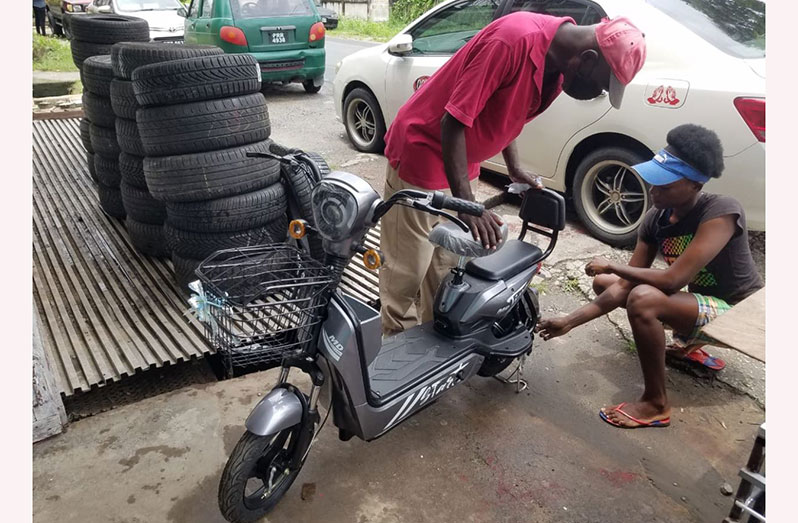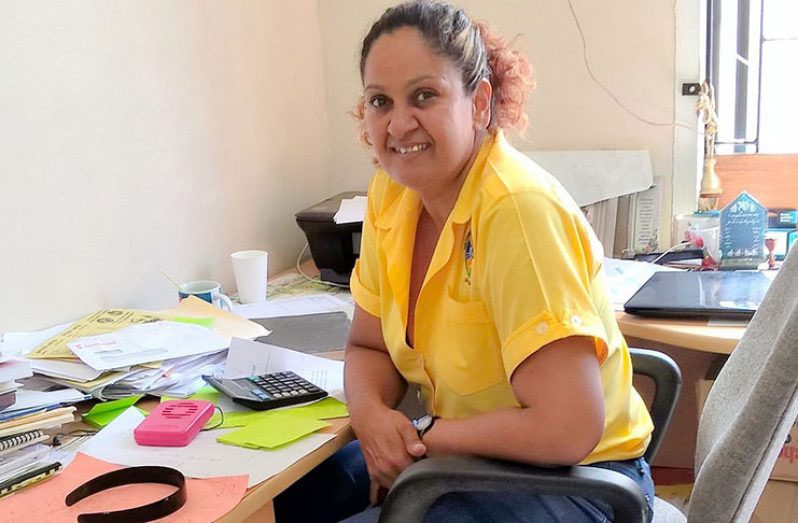-National Road Safety Council says users will have to be licensed
-Bikes to be covered under motorcycle law
THE use of electric bikes has been increasing locally, with adults, and even children under the age of 16, utilising them to undertake day-to-day activities such as work, shopping, and even school, in both the rural and urban parts of the country.
Since this mode of transportation first started gaining popularity within Guyana, these bikes were uncategorised and left unregulated for some time.
Commissioner of Police (ag) Nigel Hoppie, on Thursday last, disclosed that the Guyana Police Force and the Guyana Revenue Authority (GRA) are currently drafting rules to govern the use of these bikes.
“That is an ongoing discussion right now with GRA; the Traffic Chief is actively involved because we have seen where persons using these bikes, there is no age limit and that is one of the things.
So we are in discussion to ensure those things are regularised,” the Police Commissioner noted.
Meanwhile, Coordinator of the Guyana National Road Safety Council, Ramona Doorgen, during an interview with this newspaper, disclosed that a major part of the rules currently being drafted includes barring children under the age of 16 from operating the bikes.
Retailing for between $70,000 to $150,000, the electrical bikes cost considerably less than the conventional motorcycles, and due to the ease with which they are operated, they are becoming the go-to mode of transportation for many. Most of the bikes have speeds below 50kmph.
Doorgen stated that the Road Safety Council welcomes the decision by the GPF and GRA to regulate the use of these vehicles due to the notable misuse by operators across the country.
She explained that, in many cases, persons using these electric bikes, especially children, are seen without helmets, which is in direct breach of the road safety procedures. She said this practice goes hand in hand with the fact that these “bike” users do not hold licences and have not undergone training on proper road use.
“We saw the problems they were having. They had small kids and big people riding the bikes in the traffic and all of that too, and we saw the dangers that it was posing, not only to the persons that riding them but also to the public and drivers at large. So, we had approached the ministry and asked the minister to let us look seriously at it.”

USERS WILL HAVE TO BE LICENSED
The new rules governing the use of these bikes, according to Doorgen, will seek to categorise electric bikes as motorcycles, allowing them to be registered and given a motor vehicle road service licence, in addition to requiring the operator to be the holder of a valid driver’s licence.
This change will directly affect those users of the vehicle who are under 16, and cannot apply for a driver’s licence and according to Doorgen, this is to safeguard their lives.
“You’ll have to have a licence to be able to operate it in public spaces. They’re now going to look at it as a motor vehicle; they’re using the same Act and whatever policies that govern motorcycles are the same ones that is going to be used to govern electric bikes. So, definitely children would not be able to ride in public spaces with them.”
The road safety coordinator noted that, since the bikes started gaining popularity locally, there have been four recorded fatalities involving electric bikes.
She explained that, while none of the recorded fatalities were children under the age of 16, she believes there needs to be systems in place to prevent such from happening.
Speaking to the use of the bikes in rural communities such as Wakenaam and Leguan where motorcycles and most recently electric bikes play a major role in transport, Doorgen told the Guyana Chronicle that she does not believe this new set of rules would negatively affect the day to day lives of citizens.
“Just like how they were using the motorcycles, this new rule would just encompass electric bikes so people will be able to continue using their bikes, with the only difference being that they would have to get their licence and so and follow the road rules regarding helmets and all of that which would all add to their own personal safety; so I believe that this would positively impact them too,” Doorgen said.
She reiterated that the aim of the policy was not to disenfranchise any member of the population but to protect all categories of road users.




.jpg)









